Publications

May 19, 2021
The U.S. solar photovoltaics industry has taken off over the past decade, but without deliberate action low- and moderate-income communities could be left behind in the transition to clean energy. Drawing on substantial literature related to multiple dimensions of low-income solar finance and interviews with key informants in the field, authors Eric Hangen, Rebecca Regan, and Sarah Boege…
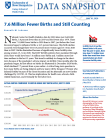
May 10, 2021
In this data snapshot, author Kenneth Johnson reports that new data for 2020 show a 3.8 percent decline in births since 2019 and the fewest since 1979. There were 16.5 percent fewer births last year than in 2007, just before the Great Recession began to influence births.
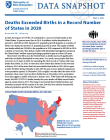
May 5, 2021
In this data snapshot, author Kenneth Johnson reports that many more deaths, fewer births, and less immigration produced the United States’ smallest percentage population gain in at least 100 years.
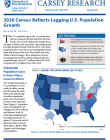
April 27, 2021
In this brief, author Kenneth Johnson reports that the first data from the 2020 Census reveal a significant slowdown in U.S. population growth.
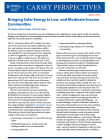
April 23, 2021
The U.S. solar photovoltaics industry has taken off over the past decade, but without deliberate action low- and moderate-income communities could be left behind.
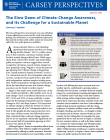
April 22, 2021
In this perspectives brief, author Larry Hamilton summarizes his research on public perceptions of climate change, drawing on a decade of nationwide and New Hampshire surveys.
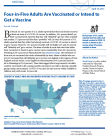
April 16, 2021
In this data snapshot, author Sarah Boege reports that by March 29, one-quarter of U.S. adults reported that they had already received at least one dose of a COVID-19 vaccine. In addition, 39.1 percent hadn’t yet been vaccinated but reported that they will “definitely” get one when available and another 17.4 percent said that they “probably” will. However, 10.1 percent of adults will “probably…
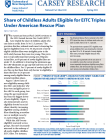
April 6, 2021
In this fact sheet, author Jess Carson explores how changes to the Earned Income Tax Credit in 2021 affect childless tax filers. Findings show that the share of childless adults who can claim a credit has tripled under the new provisions, and that the biggest driver of widened access is lowering the minimum age for eligibility.

March 25, 2021
In this report, authors Quixada Moore-Vissing and Bruce Mallory build on previous Indexes published in 2006, 2009, and 2013 to take stock of New Hampshire's civic well-being in light of the changes the state has experienced in recent years. Their research draws on data from the U.S. Census, the Social Capital Community Benchmarks survey, and the UNH Granite State Poll.
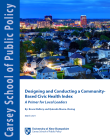
March 25, 2021
This primer offers suggestions for designing and conducting a community-based civic health index (CB Index). A CB Index allows local leaders to determine what is most important or relevant to measure in a particular town or small city and to then collect local data that reflect the specific civic activities of that community’s residents. With these data in hand, local leaders and community…
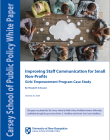
January 20, 2021
In this white paper, author Elizabeth Schwaner discusses challenges faced by Girls' Empowerment Program, a non-profit organization based in the northeast U.S. that serves at-risk girls in its community through a year-round mentoring program paired with a residential social summer camp. Despite its undeniable strengths, issues with communication are a persistent challenge. Like many small…
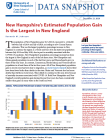
December 23, 2020
In this data snapshot, author Kenneth Johnson reports that the population of New Hampshire grew by 5,500 to 1,366,000 between July of 2019 and July of 2020, according to new Census Bureau estimates. This was the largest percentage population gain in New England.
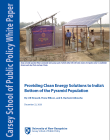
December 22, 2020
In this white paper, Jill Howard, Fiona Wilson, and E. Hachemi Aliouche discuss how Oorja Development Solutions, a social enterprise based in India, is working to provide integrated energy solutions to revitalize the agrarian economy, alleviate poverty, and fight climate change in rural India.
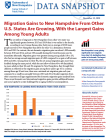
December 10, 2020
In this data snapshot, author Kenneth Johnson discusses how New Hampshire is now gaining significantly more migrants from other U.S. destinations than earlier in the decade. The largest gains are among young adults.
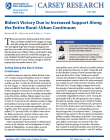
November 11, 2020
Joseph Biden won the 2020 presidential election because Democratic support increased across the entire rural–urban continuum. The incremental gains at each point along the continuum were modest, but in a tightly contested election small changes in the vote matter.
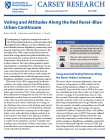
October 20, 2020
Political commentary often divides the nation into two partisan zones, urban and rural, but new analysis demonstrates that the rural–urban gradient is a continuum, not a dichotomy. In this study of the 2018 congressional midterms, authors Kenneth Johnson and Dante Scala confirm their earlier analysis of the 2016 presidential election and demonstrate how voting patterns and political attitudes…
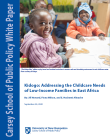
September 28, 2020
To unlock the potential of this region’s millions of children, Kidogo, an innovative East African social enterprise, is harnessing the power of social sector franchising. Kidogo partners with women running informal daycares in Kenya’s urban slums to better the condition and profitability of their micro-businesses. By working with local women entrepreneurs, “Mamapreneurs,” and drastically…
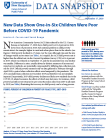
September 17, 2020
New American Community Survey (ACS) data released by the U.S. Census Bureau on September 17, 2020 show child poverty at 16.8 percent in 2019, down from 18 percent in 2018. Sub-national patterns in child poverty remain intact; for example, higher in rural and urban places than in the suburbs. Importantly, 2019 child poverty declines are likely now outdated due to the COVID-19-related recession,…
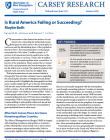
September 8, 2020
In this brief, authors Kenneth Johnson and Daniel Lichter summarize their peer reviewed article in Demography that provides cautionary lessons regarding the commonplace narrative of widespread rural decline and urban growth.
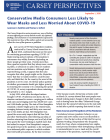
September 1, 2020
In this brief, authors Lawrence Hamilton and Thomas Safford discuss the results of a new UNH Granite State Panel survey asking questions to a statewide poll of New Hampshire residents to learn about their perceptions and behavior during the COVID-19 pandemic.
